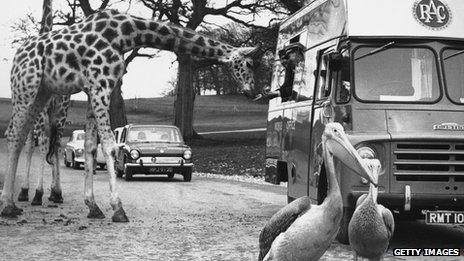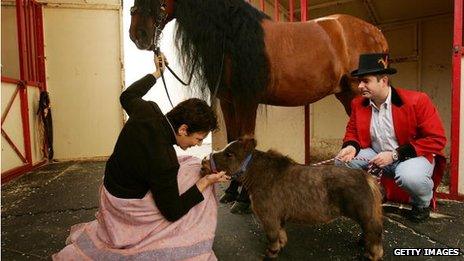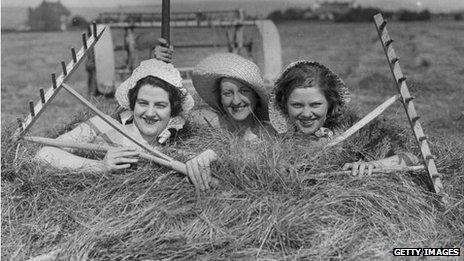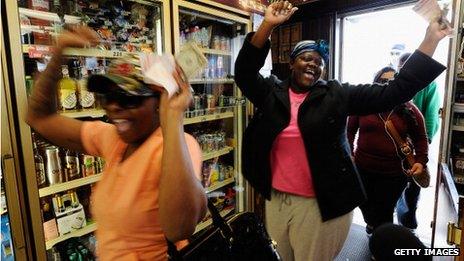How to answer those bizarre job interview questions
- Published

If you were an animal, what would you be? Employers are now asking trickier questions
A colleague of mine once went for a job as a trader at an investment bank in the City.
During the interview he was asked, "How many one pence coins could you fit into this room?"
He immediately started doing some calculations, and after a minute or so, announced his "best guess" on the answer.
He did not get the job.
What the bank had wanted was someone who could come out with any old answer, but who would have the confidence to convince the markets that they were right.
Such challenging questions are becoming ever more commonplace in interviews, it seems, as employers seek to separate the wheat from the chaff.

"There is much more competition for jobs, and employers are also becoming more risk averse," says Claire McCartney from the Chartered Institute of Personnel and Development (CIPD).
"It's difficult for people to stand out if they ask the routine questions, so doing things differently will help them get the best candidate," she says.
With so many self-help websites, candidates can also be quite practised on standard interview questions, says Claire.
In a new report, the jobs website Glassdoor collected 350,000 interview questions from candidates who had faced a grilling.
Glassdoor says anyone going for a job these days needs to be ready to answer such challenging questions, along with all the standard enquiries.
So what sort of questions are employers asking, and what is their real purpose? We asked two experts to give us their answers.
How do you fit a giraffe in a fridge?

This question was asked by an interviewer at an investment bank in the City of London for a job as a sales trader.
Why the question is being asked:
Rusty Rueff, a career expert at Glassdoor, says:
This question is testing a candidate's creative skills, including how a candidate can solve difficult and even unusual challenges that might arise. Candidates should think through a response out loud.
Remember that the interviewer is more interested in how you get to an answer, versus what the answer might be. Also keep in mind that some questions are unrealistic without compromises being made.
Suggested answer:
"To get to this answer, can you provide me further detail, for example, how big is the giraffe? How big is the fridge? Are we in a country where killing a giraffe is legal or not?"
Demonstrating that you need facts and truths before jumping to a conclusion can be an advantage.
Continuing on: "If the giraffe can die, then fitting one into the fridge has to do with emptying out the rest of the refrigerator's contents and using the tools around me to ensure it fits. What tools do I have to work with in this space?"
Would you rather fight a horse-sized duck, or 100 duck-sized horses?
This question was asked by an interviewer at a mining company for a job as a dry bulk marketer in London.
Why the question is being asked:
John Lees, author of Job Interviews: Top Answers to Tough Questions, says:
This question looks oddball but is a humorous and creative way of testing deductive reasoning, which requires you to make and check realistic assumptions and make a recommendation of best course of action.
Your choice is far less important than the thought process you reveal when answering.
Suggested answer:
Demonstrate each step of your thinking:
"OK, well I reckon both might kill me, but I would start by thinking about how aggressive each animal might be. Horses can bite and kick, and even though they are small, being hunted by a pack gives you no escape route."

Not quite duck-sized, but very small
How many ways can you get a needle out of a haystack?
This question was asked by an interviewer at an international bank for a job as a senior java developer in London.
Why the question is being asked:
Rusty Rueff says:
This question is another example of an interviewer testing a candidate's ability to solve problems creatively. Think through a response out loud.
Suggested answer:
"What we can see, we can find. In this case what if we were to drench the haystack in a colour that would make the needle easier to see?
"Trying to differentiate silver from the gold of hay is hard to do, but if I could turn the hay green, blue, or purple then the silver of the needle would be much more obvious."
The point is to shed a different light on the problem to find a new solution.
John Lees has more straightforward suggestions:
"If the needle is made of steel, a magnet will do the trick. Or you could simply burn the hay off and the needle will remain."

Still no sign of that needle
If you were to win £1 million, what would you do with the money?
This question was asked by an interviewer at an accountancy firm in Birmingham.
Why the question is being asked:
Rusty Rueff says:
Given this question was asked at a major accounting firm, this question is likely testing both the practical and longer term planning skills of the candidate.
This is an accounting firm after all, so they probably would like to see someone who wouldn't just blow through £1 million. Does this person live in the moment or do they think about the next 10 to 20 years?
Suggested answer:
Again, sound out your thought process. "While it would definitely be exciting to win £1 million, I would want to think through all my options and also be aware of how this money would be taxed before I think about allocating the funds.
"Some of the options I would consider include how I could invest this money, how much I could donate to a charity, and how I could use a portion of it to celebrate the win. But, if you are concerned, I'd still come to work on Monday."
John Lees adds:
"If you can't think of anything, say, 'Great question. What's the best answer you've heard today?'"

Don't spend your winnings all at once
How would you explain Facebook to your grandma?
This question was asked by an interviewer at a software company for a sales executive role in London.
Why the question is being asked:
Rusty Rueff says:
This question makes a candidate break down a seemingly complex concept. The interviewer wants to see how a candidate can explain an idea in a way that is meaningful and relevant to the end user.
It's also about finding something someone understands from the past in order to comprehend the future. Given this is a sales role, it's a key part of successful selling.
Suggested answer:
"First, it's important for me to let you know that I know my audience well in this case and have done my research on who I'm speaking with.
"My grandma does use the internet, is familiar with websites, but knows nothing yet about social networking. So, in this case, I'd say, 'Grandma, I know you love keeping in touch with your friends and family, and I know you love using the internet to find out new information.'
"Then I would say, 'There is a website called Facebook which allows you to both connect and stay in touch with your friends and family online, while you're also able to follow companies and organisations you like, to find out their latest news and products. Do you have time, Grandma, for me to show you?'"
- Published11 June 2013
- Published15 February 2013
- Published20 June 2012
- Published19 June 2012